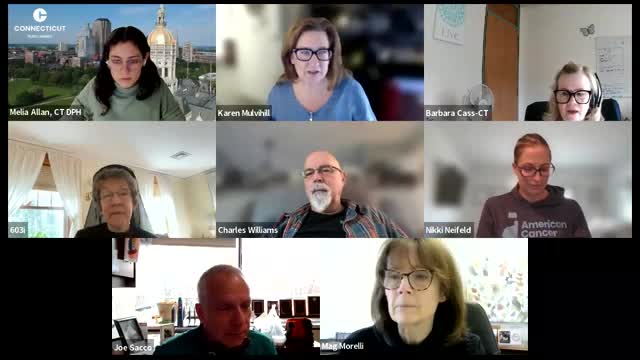Connecticut DPH advisory group outlines MOLST modernization, training and e‑registry discussions
Get AI-powered insights, summaries, and transcripts
Subscribe
Summary
Barbara of the Department of Public Health gave the advisory group an overview of the state’s MOLST (Medical Orders for Life‑Sustaining Treatment) modernization effort, saying revised materials — a redesigned form, updated policies and three different training slide decks — are complete and now in leadership review.
Barbara of the Department of Public Health gave the advisory group an overview of the state’s MOLST (Medical Orders for Life‑Sustaining Treatment) modernization effort, saying revised materials — a redesigned form, updated policies and three different training slide decks — are complete and now in leadership review. "The form has been revised, eliminating the witness signature," Barbara said, and officials have added new policies outlining how an eligible provider or a patient can revoke or modify a MOLST.
The group described three training tracks being prepared: EMS, provider and consumer. Melia, who is producing the CT‑Train modules, reported she has begun recording videos and producing training materials, but said the work is largely one person’s effort and will take time. Officials said the revised materials will not be released in 2025 and might require legislative changes before rollout.
Dr. Sacco, a physician on the call, framed the difference between MOLST and other advance‑care documents: "The MOLST form is an advanced directive that is specifically intended for seriously ill people, and it is intended for them to be able to clarify legally enforceable directives that are in regard to their condition today," Dr. Sacco said. He said living wills address hypothetical futures and can be vague; by contrast, MOLST translates patient preferences into medical orders that apply to the patient’s present condition.
Committee members listed specific changes and clarifications: the MOLST packet now spans three pages; the witness signature requirement has been removed; the policies and procedures explicitly describe revocation and modification steps; and the training will include FAQs and separate slide decks tailored to EMS, providers and consumers. Speakers emphasized a ‘‘digital‑first’’ approach: the form may be scanned into an electronic medical record, and staff noted ongoing conversations about an electronic registry modeled on systems in Oregon and New York.
Speakers cautioned that an interstate electronic registry raises technical and legal questions, especially for border communities where providers and hospitals cross state lines. As one example, the group discussed Stonington patients whose MOLST orders signed in Connecticut may not be treated as medical orders in neighboring Rhode Island hospitals. Staff said portability and interoperability remain unresolved and would require funding and further negotiation.
The advisory group also discussed eligibility and authority. Presenters reiterated that only individuals who meet statutory or program criteria should complete a MOLST and that eligible providers must complete the required training; the group noted that certificate courses will be available but that only MDs, DOs, APRNs and PAs can be designated as eligible providers to sign orders. Members raised questions about whether a legally appointed health‑care representative can override a patient’s signed MOLST; presenters said it is legally possible even if it is ethically discouraged and that question requires careful documentation of intent and best interests.
Pediatric issues were a recurring concern. The committee reviewed parent feedback that keeping a printed form on a refrigerator can be emotionally harmful and discussed pediatric‑specific training and guidance; Barbara offered to present materials used with a pediatric hospice work group at the committee’s next meeting. Connecticut Hospice reported talks with Yale clinicians about resuming inpatient pediatric palliative services in Branford, with potential respite and home‑based care components.
Why it matters: MOLST converts patient preferences into medical orders that travel with the patient and guide emergency and inpatient care. The committee’s revisions aim to reduce internal contradictions, clarify revocation rules, and expand public and provider education. However, staff cautioned that some implementation steps (notably an electronic interstate registry and certain legislative changes) will require additional funding, and no firm rollout date was provided.
Next steps and follow‑ups: staff will continue CT‑Train production, circulate finalized leadership review materials when available, and present pediatric MOLST materials at the committee’s next meeting. Committee members recommended forming a training support team to expand outreach to nursing homes, assisted‑living facilities and managed residential communities.
Provenance: The advisory group’s MOLST modernization discussion begins at 00:02:06 and continues through 00:24:34 in the meeting transcript. Topic introduction excerpt: "Well, I could just share that we are continuing with our 2 modernization..." (00:02:06). Topic finish excerpt: "That's my most update." (00:24:34).
